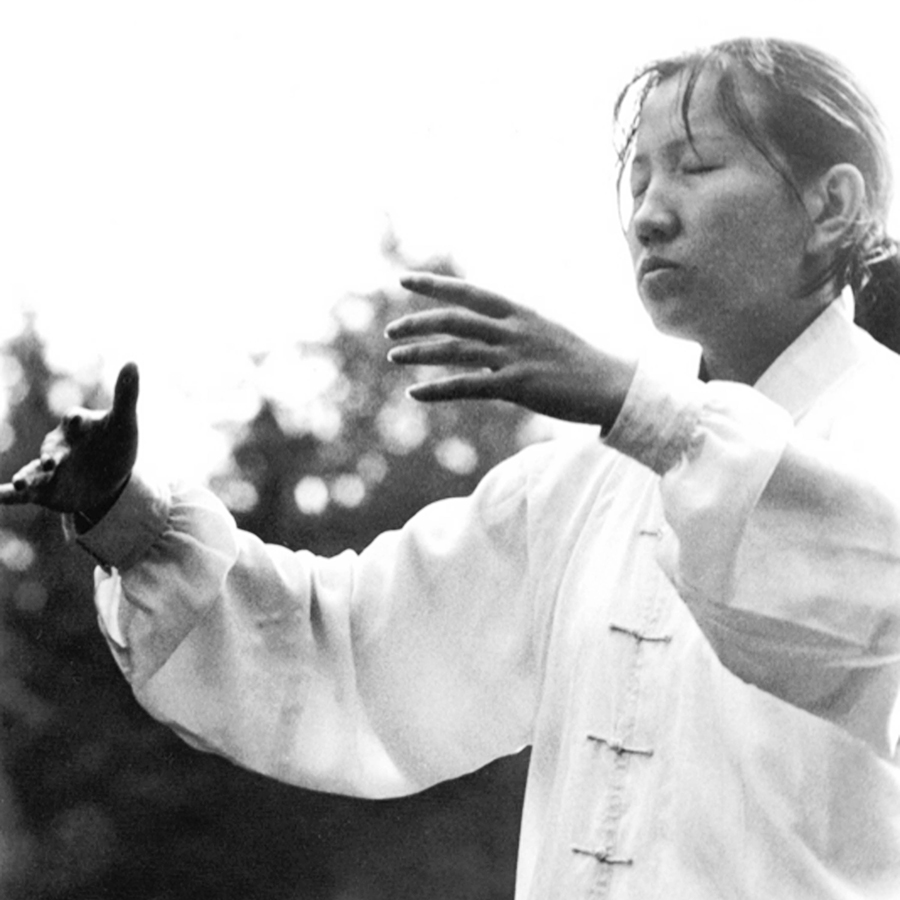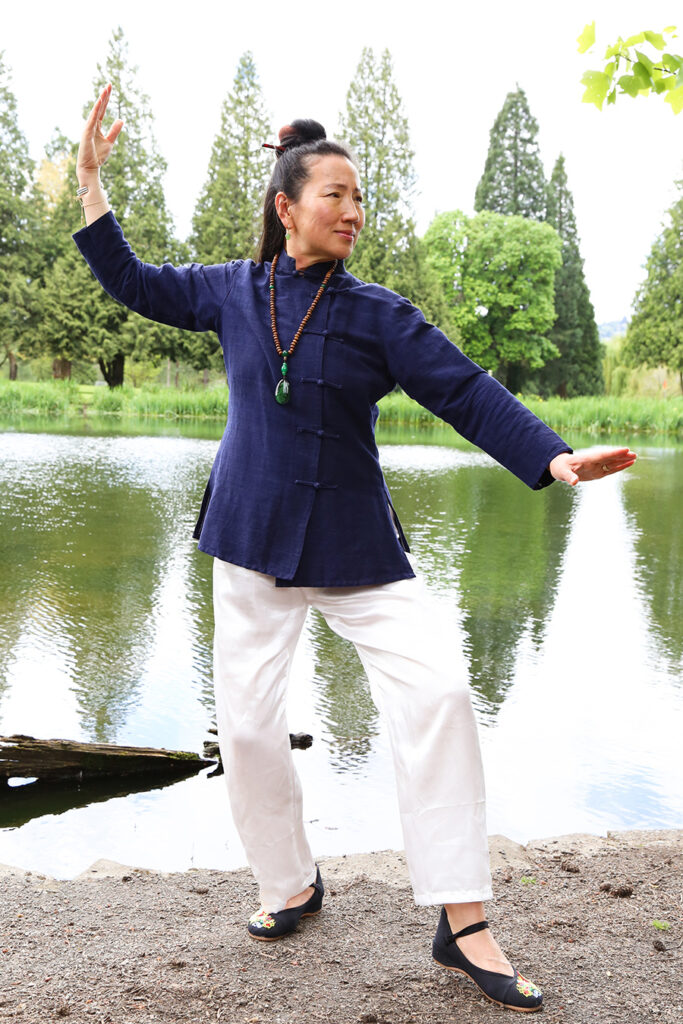
Medical Qigong
Medical Qigong is an ancient form of Chinese energetic medicine and is a branch of Chinese Medicine. The methods offer a way to harmonize qi to support the optimal function of the Zang-Fu organs and facilitate free-flowing Qi throughout the body by unwinding knots and removing blockages.
Why Practice Qigong?
Because each person is unique, each person’s reason for learning Qigong, as well as each person’s Qigong experience, is different. For one student of the Ling Gui School, the initial impetus to learn Qigong came from wanting relief from the debilitating symptoms associated with Fibromyalgia. Another student wanted a deeper connection to life and his place in it. Yet another student wanted a non-impact method of keeping fit and healthy. For everyone, however, this is a journey and the reasons for practicing Qigong evolve as the Qigong experience grows. In the end, Qigong is as large as the universe and just as mysterious and full of surprises. We practice Qigong to return to the harmonies of nature, to our natural place in the universal patterns.

“Qigong is as large as nature and full of surprises.”
-Master Liu He

What is Qigong?
Qigong is a philosophy of life that fosters wisdom, well-being, and harmonious living. The physical aspect of Qigong involves regular practice of one or more Qigong methods, a combination of movement, breathing techniques, mantra, visualization, and meditation. In order to completely engage in Qigong, the practice of these physical methods needs to be anchored in understanding of Daoist, Buddhist and other philosophies of life from which the practice of Qigong developed. When practiced regularly with integration of Qigong philosophy in your daily life, Qigong purifies the body and mind of toxins, and opens the body and mind to receive the natural flow of vital energy in the world.
What is Medical Qigong?
Medical Qigong refers to the category of Qigong methods that have been developed to address specific diseases and imbalances. While all Qigong practice can eventually lead to well-being, certain methods will address a specific problem much more directly and efficiently. This is not so different from how we think about food. Of course, all food is nourishing for us in one way or another. But if you are suffering from an illness due to lack of Vitamin C, then you will make sure and eat lots of citrus fruits. Similarly, Jade Woman is a Qigong method that helps to increase the blood and purify the liver for both men and women. In addition, this form is especially beneficial for the health of women’s gynecological system, and the smooth transitioning of the various cycles in a woman’s life. If a person is suffering from sleep disorder, Jade Woman might not be the most obvious choice. Rather, practicing Sleeping Buddha will most directly balance this problem. At the Ling Gui International Healing Qigong School, students are exposed to a number of different medical Qigong forms, from forms good for general health, such as Eight Treasures, to forms developed to address specific issues, such as Ling Gui Qigong for arthritis or Hulu Gong for boosting the immune system.
Of course, medical Qigong forms do not replace medical care from physicians or other health care practitioners. These forms are meant to provide adjunctive care. Even in ancient times, Chinese healers prescribed Medical Qigong forms for their patients to practice along with herbal formulas, acupuncture and other treatments.
Medical Qigong is an ancient form of Chinese energetic medicine and is a branch of Chinese Medicine. The methods offer a way to harmonize qi to support the optimal function of the Zang-Fu organs and facilitate free-flowing Qi throughout the body by unwinding knots and removing blockages.
Qi blockages can occur in our daily life as a result of poor diet, lifestyle, injuries, surgery, emotional issues, and trauma. With practicing Qigong, the blockages are released and the body strengthens, regulating the nervous system, hormones, and immune system.

Frequently Asked Questions
What experience do I need to take a Qigong class?
None at all. We welcome beginners as well as seasoned practitioners.. Each person brings their unique life experiences to the practice of Qigong, and enriches the Ling Gui School, its teachers, staff, and fellow students. Regardless of the level or years of experience with Qigong, we ask that you come to the practice of Qigong as a beginner with the freshness of a beginner’s mind where all the possibilities remain.
Can elderly people learn Qigong?
Yes. Medical Qigong is in fact a wonderful form of exercise, relaxation and energy building for elderly people. The gentle yet powerful movements of Qigong can be practiced by all people, including elderly people with limited mobility. By cleansing the body of blockages, and by nourishing the energy of the body and mind, Qigong is a great way to prevent injuries and chronic illnesses. Qigong has been used in Asia in rehabilitation after surgeries to help the body and mind return to health.
What’s the difference between Tai-ji-quan and Qigong?
Defined broadly as “energy practice,” Qigong includes Tai-ji-quan. The exploration of energy work in China is thousands of years old, and forms the early basis for Chinese medicine as well as Chinese martial arts. As the ancient philosophers considered the factors that affect human health and longevity, they understood that humans are part of nature and participate in the energy patterns of the universe. In studying the workings of the universe, they came to understand the repetitive patterns of the universe, and related those patterns to the workings of the human body. They developed methods of keeping the body and mind strong and available to receive revitalizing energy from the world.
Tai-ji-quan is a part of this energy work tradition. The difference between Tai-ji-quan and medical Qigong methods is that while Tai-ji-quan springs from the martial arts elements, medical Qigong is rooted in Chinese medicine elements of this tradition.
What’s the difference between Yoga and Medical Qigong?
Yoga, as an ancient practice of enlightenment which includes practicing physical postures, is similar to Medical Qigong. The philosophy and practice of Yoga originates from India, and is steeped in the tradition and culture of India. Qigong, on the other hand, is an ancient practice that originates from China that retains understandings about life rooted in Daoist, Buddhist and Confucian philosophies. In comparing the physical practice of Yoga and Qigong you will find that, while both Yoga and Qigong include breathing practices and meditation, Yoga tends to focus on alignment, muscles and holding of postures, while Qigong concentrates more on energy and flow of movements.
Can I practice Medical Qigong if I’m pregnant?
The general answer is yes. However, each woman’s pregnancy is different, and we recommend that the expectant mother consult her primary care provider as well as a qualified and experienced Medical Qigong teacher. There are two Medical Qigong methods taught at the Ling Gui International Healing Qigong School that focus on women’s physiology and are especially beneficial for a woman to practice before, during and after pregnancy. Jade Woman and Nourishing Woman are complementary forms that are wonderful to practice in preparation for becoming pregnant. Depending on your energy level and health, Jade Woman is wonderful to practice during the first two trimesters. Nourishing Woman provides very effective support for the expectant mother and the fetus throughout the pregnancy, as well as providing excellent care for the mother after delivery. Practicing Nourishing Woman after delivery also supports abundant and nutritious breast milk for the baby.
Can I practice Medical Qigong if I have limited mobility?
Yes. For a person with very little mobility and/or energy, they may begin practicing by visualizing the movements in the mind. Then slowly, as mobility and/or energy returns, movements can be added to the visualizations. Often students find that practicing Qigong gives them more energy as well as flexibility and mobility.
Is Qigong a religion?
No. Qigong is a philosophy of life that fosters wisdom, well-being and harmonious living. It is not a religion or a cult. While individual Qigong teachers may discuss Daoist, Buddhist or other Chinese religions and philosophies, Qigong itself is not a religion. If you have any doubts about a Qigong teacher and his or her integrity, we recommend that you trust your response and re-evaluate your involvement with that teacher.

Ling Gui Qigong Methods
The Liu family Qigong is a rare gift that has been handed down and sustained for generations. These practices have not only maintained our family’s well being, but they have also been used to help many others.

